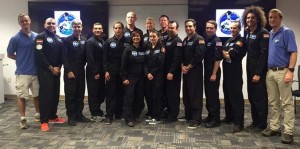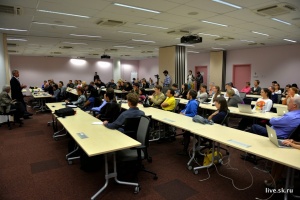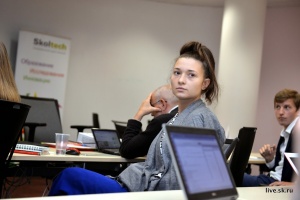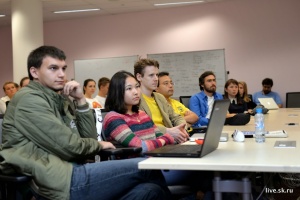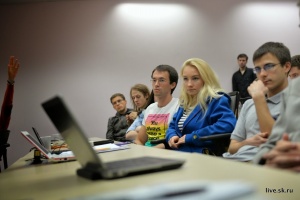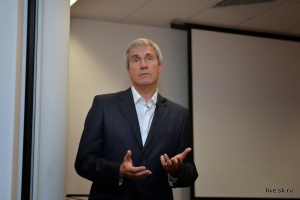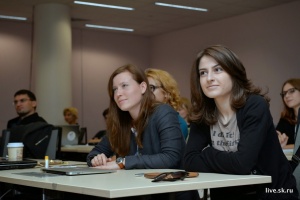Skoltech academic year is intense and demanding. The summer time is when our students (and faculty) can relax a little bit, go on vacation and recharge their batteries for the next intense and demanding year, be it at home with the family, on the beach, or maybe on a top of a mountain. Continue reading
Skoltech is an international graduate research-focused university that was founded by the group of world-renowned scientists in 2011. Skoltech's curriculum focuses on technology and innovation, offering Master's programs in 11 technological disciplines. Students receive rigorous theoretical and practical training, design their own research projects, participate in internships and gain entrepreneurial skills in English. The faculty is comprised of current researchers with international accreditation and achievements.
Tag Archives: наса
From NASA to Skoltech and back
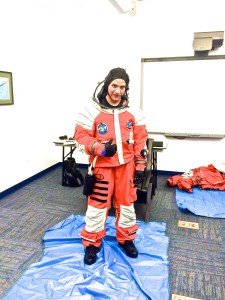 “I came to Skoltech because I wanted to do cooperation between the U.S. and Russia in the space sector” says Axel Garcia, a student in the Skoltech Space Center. Garcia is an example for the international-innovative-entrepreneurial nature of Skoltech. Originally from Puerto Rico, growing up in Florida, at the age of 23, Garcia already worked at NASA as an electrical engineer, received a Master’s degree from EPF Graduate School of engineering in France, and currently working on his second Master thesis in Skoltech.
“I came to Skoltech because I wanted to do cooperation between the U.S. and Russia in the space sector” says Axel Garcia, a student in the Skoltech Space Center. Garcia is an example for the international-innovative-entrepreneurial nature of Skoltech. Originally from Puerto Rico, growing up in Florida, at the age of 23, Garcia already worked at NASA as an electrical engineer, received a Master’s degree from EPF Graduate School of engineering in France, and currently working on his second Master thesis in Skoltech.
Recently Garcia went back to NASA, but not because of his work engagements there. He was one of the selected few to participate in the PoSSUM project, a non-profit suborbital research and education program devoted to the study of our upper atmosphere and the role it plays in the understanding of our global climate, held at the Embry-Riddle Aeronautical University in Daytona Beach, FL. We asked Garcia to tell us about this unique experience, and its connection to his cooperation aspirations.
Q: how did you manage to get the invitation to the program?
A: I had to apply, to write an essay and do an interview. It was a competitive thing. We have been taking courses remotely, two months before the project.
A: I was with a group of PhD students, from Egypt, Canada, the US, Portugal, Australia and India. They were all really smart, and they all wanted to become astronauts, so it was like a competition. For me the most amazing thing was to be with all these people. They were all scholars, and they all motivated me to keep into this program.
Q: What did you do during this part of the program?
A: Mostly it was how to perform science in the upper atmosphere. We were trained to go to space in commercial space flights in the future, and so we could be qualified to be the ones manipulating all the equipment and all the cameras, to do this tomography science – measuring clouds, to see how space weather is changing and so on. We had different equipment, we did aerobatic flights, and we experienced micro-gravity.
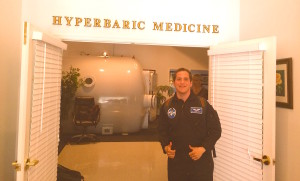 We also went into a hyperbaric chamber, which simulates the effects of high altitude on the human body. When you go up the pressure increases, and you’re not getting oxygen into your system, so people kind of faint and feel funny. Sometimes they start laughing without a reason. We were trying to see how our body is affected by this, if we can actually go through this hypoxia.
We also went into a hyperbaric chamber, which simulates the effects of high altitude on the human body. When you go up the pressure increases, and you’re not getting oxygen into your system, so people kind of faint and feel funny. Sometimes they start laughing without a reason. We were trying to see how our body is affected by this, if we can actually go through this hypoxia.
We also had a lot of courses about the atmosphere, about science, how to do analysis in the atmosphere, because we were training to become scientist astronauts, not pilots. In the end, naturally, we had a test.
Q: So you want to be an astronaut?
A: Yes! This program gave me qualification to become a scientist astronaut in the future. Not a NASA astronaut, but a commercial space flight astronaut for either Virgin Galactic or other private companies. My title now is “Astronaut candidate”, because I’m qualified to do the assignments they will need to do in the future in these private flights. I’m not an astronaut yet, I guess I will apply in the future.
But I also have this entrepreneurship spirit, and I want to make collaboration between the two countries. I believe that to achieve higher – to go to the moon again, to go to Mars – we need to collaborate together. It’s really expensive to go to space, so you really need to get organized and divide the work to different people.
Q: How do you connect this with the PoSSUM program?
A: One of the reasons I went there is because of Skoltech. I went to learn there about the equipment and to understand all the training that these astronauts go through, so that the entrepreneurship project I’m working with Prof. Rupert Gerzer now will become possible. We want to bring this mentality and these training activities into Russia.
Q: what can you tell us about this project?
A: I am very interested in human space flights and sub-orbital flights (a flight that you go into space for five minutes), which I think a lot of people are interested in, as tourists. We are trying to commercialize the training, to make a facility that many people can use to train like an astronaut. People who want to do parabolic flights and orbital flights, can use this facility to do their training with us. It will be cheaper for them.
Come Fly With Him
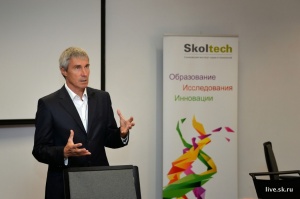
Dr. Sergei K. Krikalev, cosmonaut and space explorer, during a talk with students and faculty at Skoltech
When Dr. Sergei K. Krikalev entered the lecture hall, a member of the audience turned to her friend and said in hushed voice: “here comes a legend”. This was not starry eyed hyperbole. There is ample evidence to support the choice of words.
As a cosmonaut, Krikalev completed six flights. He has spent more time in space than any other human: a total of 803 days, 9 hours, and 39 minutes aboard MIR and the ISS. He was the first person ever to enter the International Space Station. A fluent English speaker, he is a living symbol of collaboration between superpowers. A quick web search yields images of him in a trademark NASA astronaut suit, embroidered with Russian and American flag patches. After he had retired from active duty as an astronaut in 2005, he held senior positions at the Russian space program. And on his free time he crisscrosses Russia, sharing his story with awestruck students – and their professors.
At the beginning of his Q &A session at Skoltech he directed a question at the audience.
“Should I assume you are technical experts or simply curious?”
“Both!”, a professor replied, extracting a smile out of the chiseled jawed spaceman. This turned out to be an honest response: queries from the crowd revealed varying degrees of experience and knowledge.
Bram Caplan, the university’s director of student affairs tested the veteran cosmonaut’s flexibility: “If you had 100 million dollars to invest in a space research project, what would you do with the money?”
Immediate response: “I’d try to get more money.” Then came a more thoughtful reply: “we need to build a new spacecraft and a space base that would support missions and supply parts for trips beyond what we’ve achieved so far “.
Saksupapchon Punyapat, a student from Thailand, smilingly observed that how questions about lessons learned always orbit around success. “But what have you learned from failure?”
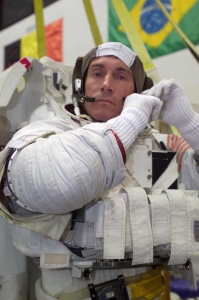
Sergei Krikalev, cosmonaut and guest speaker at Skoltech, wears a training space suit during a NASA training in June 2004
“Let me say what I think is needed in order to have a better chance at achieving success. Know that your decisions and choices matter. and yes, you really do must study a lot. And if you want to join the space industry, you need to live in not the most comfortable conditions and learn to fly an aircraft and make sacrifices. Like I did. ”
Then there were more professional questions about vertical landing, the optimal number of crew members to be carried aboard a space vehicle, and the future challenges of design and engineering. And what about the differnce between government and private sectors’ involvement in space exploration?
“It has to be said: governments were there first,” Krikalev replied immediately and paused, as if resisting the temptation to say that ‘we were there first’.
He continued. “When things were risky and unsure and potentially very costly in terms of human lives and, less importantly but still crucially, money, the state took it upon itself to explore outer space. Only when things stabilized did the private sector join in. On the other hand ‘private’ means simplified and cheaper. There are less verification processes, and a better understanding of cost structures. As for Russia, we don’t see similar private activities here because our knowledge and procedures for defining costs are not as transparent as in the west. Then again, private western companies do not carry out manned missions. Not yet. The way we’re going to proceed from now in is to involve more private companies to solve parts of the missions, but not whole missions, especially not the risky ones – like a flight to Mars. When we don’t know how to enter the atmosphere or how to build a heat shield or how long a mission will take or how much it will cost – the government will shoulder all this risk.”
After 90 minutes and an ever growing stream of questions came the winning query: So how much would you pay to travel as a private space tourist?
“Hard to say, really. After all I got paid to fly to space.”
* The Skolkovo Institute of Science and Technology (Skoltech) is a private graduate research university in Skolkovo, Russia, a suburb of Moscow. Established in 2011 in collaboration with MIT, Skoltech educates global leaders in innovation, advance scientific knowledge, and foster new technologies to address critical issues facing Russia and the world. Applying international research and educational models, the university integrates the best Russian scientific traditions with twenty-first century entrepreneurship and innovation.
